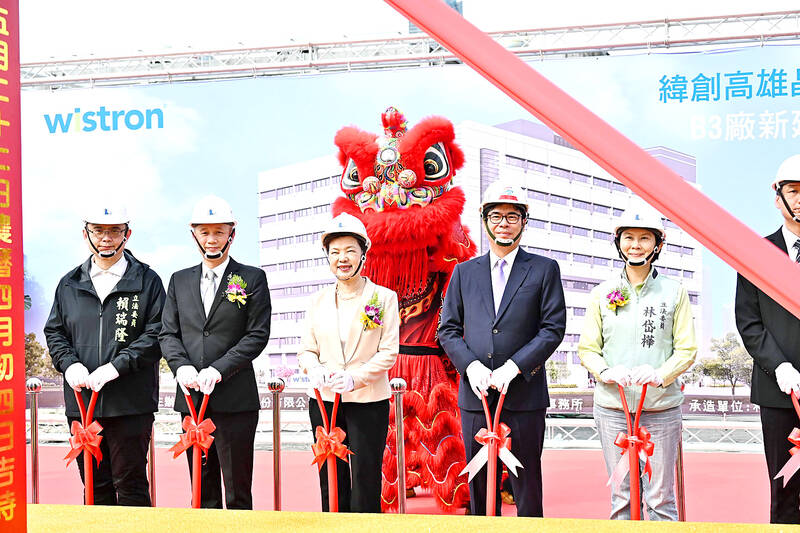Kaohsiung Opto-Electronics Inc (KOE, 高雄晶傑達光電), a subsidiary of contract electronics maker Wistron Corp (緯創), yesterday broke ground for its new manufacturing and research and development (R&D) facilities in Kaohsiung’s Cianjhen Technology Industrial Park (前鎮科技產業園區).
The company’s initial investment in the facilities is estimated to be more than NT$10 billion (US$325.98 million), the Ministry of Economic Affairs said in a statement.
The company plans to build a “smart, innovative” plant with nine floors above ground and two below, the ministry said.

Photo: Ge You-hao, Taipei Times
KOE plans to establish high-end, fully automated production lines at the plant that would be mainly engaged in the manufacturing of LCD panel modules for vehicles, and industrial control and medical applications, the ministry said.
The project is forecast to create 4,500 jobs upon its completion in 2025, it added.
Minister of Economic Affairs Wang Mei-hua (王美花) said at the groundbreaking ceremony that KOE aims to use Cianjhen Technology Industrial Park as a key production base for its automotive and industrial control panel manufacturing.
By integrating the park’s resources with nearby Southern Taiwan Science Park (南部科學園區) and Nanzih Technology Industrial Park (楠梓科技產業園區), along with the support of Wistron’s R&D facilities in Kaohsiung, the technology industry in southern Taiwan is expected to develop further, driving regional development, industrial transformation and local employment, Wang said.
Established in 1967, KOE was known as Kaohsiung Hitachi Electronics Co (高雄日立電子) before its name changed in 2012 as a subsidiary of Japan Display Inc. It was acquired by Wistron in October 2021.

Taiwan Semiconductor Manufacturing Co (TSMC, 台積電) would not produce its most advanced technologies in the US next year, Minister of Economic Affairs J.W. Kuo (郭智輝) said yesterday. Kuo made the comment during an appearance at the legislature, hours after the chipmaker announced that it would invest an additional US$100 billion to expand its manufacturing operations in the US. Asked by Taiwan People’s Party Legislator-at-large Chang Chi-kai (張啟楷) if TSMC would allow its most advanced technologies, the yet-to-be-released 2-nanometer and 1.6-nanometer processes, to go to the US in the near term, Kuo denied it. TSMC recently opened its first US factory, which produces 4-nanometer

GREAT SUCCESS: Republican Senator Todd Young expressed surprise at Trump’s comments and said he expects the administration to keep the program running US lawmakers who helped secure billions of dollars in subsidies for domestic semiconductor manufacturing rejected US President Donald Trump’s call to revoke the 2022 CHIPS and Science Act, signaling that any repeal effort in the US Congress would fall short. US Senate Minority Leader Chuck Schumer, who negotiated the law, on Wednesday said that Trump’s demand would fail, while a top Republican proponent, US Senator Todd Young, expressed surprise at the president’s comments and said he expects the administration to keep the program running. The CHIPS Act is “essential for America leading the world in tech, leading the world in AI [artificial

REACTIONS: While most analysts were positive about TSMC’s investment, one said the US expansion could disrupt the company’s supply-demand balance Taiwan Semiconductor Manufacturing Co’s (TSMC, 台積電) new US$100 billion investment in the US would exert a positive effect on the chipmaker’s revenue in the medium term on the back of booming artificial intelligence (AI) chip demand from US chip designers, an International Data Corp (IDC) analyst said yesterday. “This is good for TSMC in terms of business expansion, as its major clients for advanced chips are US chip designers,” IDC senior semiconductor research manager Galen Zeng (曾冠瑋) said by telephone yesterday. “Besides, those US companies all consider supply chain resilience a business imperative,” Zeng said. That meant local supply would

BIG INVESTMENT: Hon Hai is building the world’s largest assembly plant for servers based on Nvidia Corp’s state-of-the-art AI chips, Jalisco Governor Pablo Lemus said The construction of Hon Hai Precision Industry Co’s (鴻海精密) massive artificial intelligence (AI) server plant near Guadalajara, Mexico, would be completed in a year despite the threat of new tariffs from US President Donald Trump, Jalisco Governor Pablo Lemus said. Hon Hai, also known as Foxconn Technology Group (富士康科技集團), is investing about US$900 million in what would become the world’s largest assembly plant for servers based on Nvidia Corp’s state-of-the-art GB200 AI chips, Lemus said. The project consists of two phases: the expansion of an existing Hon Hai facility in the municipality of El Salto, and the construction of a